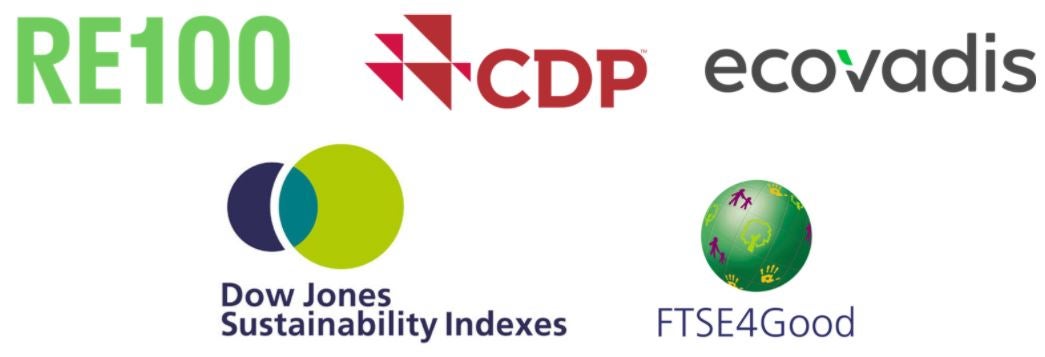Our Net Zero strategy is underpinned by a new Science Based Target aligned with limiting global temperature rise to 1.5°C above pre-industrial levels, committing dentsu to reducing our absolute Scope 1, 2 and 3 Greenhouse Gas emissions (GHG) by 46% by 2030 (from a 2019 base year). As a global leader in media and digital communications, we recognise the opportunity and responsibility we have to help our clients decarbonise their media spend, and we will reduce emissions from the media we place. We have set a target to reduce the absolute emissions associated with media by 46% from a 2019 baseline year, in line with limiting global temperature rise to 1.5°C above pre-industrial levels.
By setting ambitious, science-based targets, as well as working with our ecosystem of clients, partners and suppliers, we will set about the radical decarbonisation of our entire value chain over the next decade.
We will do this through five key areas:

Technology
We will work directly with our key technology partners and suppliers that share our leading climate ambitions. Where possible we will collaborate with such partners to reduce emissions and stipulate the requirement to source 100% renewable electricity.
Flights
We will leverage corporate travel policies and increase our use of leading collaboration technologies to facilitate remote meetings and therefore reduce our reliance on flying our staff to global destinations for business. Where flying remains necessary, we will analyse and then choose more environmentally-friendly airlines and routes.
Research and Advertising
We will set an environmentally preferred policy which includes a list of preferred suppliers with emission reduction commitments, and establish ongoing dialogue with such material suppliers on data collection and emissions reduction initiatives. We will also ensure that procurement contracts stipulate the requirement to source 100% renewable energy.
Professional fees
As with research and advertising, we will set an environmentally preferred policy which includes a list of preferred suppliers with emission reduction commitments and establish ongoing dialogue with such material suppliers on data collection and emissions reduction initiatives. We will also ensure that procurement contracts stipulate the requirement to source 100% renewable energy.
Buildings and Fleet
We will ensure all dentsu buildings meet the leading environmental criteria in key markets, both in existing buildings and any new buildings going forward, and we will implement a global energy strategy through which investments in energy efficiency can be focused. In support of our commitment to RE100, we will continue to be powered by 100% renewable electricity in all markets where we operate and collaborate with business to stimulate the production of renewables in every country across the globe.
Neutralising residual emissions
Where we cannot decarbonise directly, we will work to neutralise any residual emissions through investing in projects that sequester carbon from the atmosphere and deliver co-benefits aligned with dentsu’s wider Social Impact strategy and delivery of the UN Sustainable Development Goals.
Decarbonising media
Calculating the emissions from digital media presents a complex challenge, with little accurate data to verify calculations to date. So, we partnered with Bristol University’s Department of Computer Science along with some of the world’s most innovative media companies to launch DIMPACT; a web-based tool that calculates the greenhouse gas (GHG) emissions associated with digital media.
Our collaboration with DIMPACT is part of a wider workstream to calculate the emissions associated with digital media on behalf of our clients which we will roll out later this year. We are working with our media and technology partners to build an accurate picture of the emissions associated with different digital media types. This will allow us to quantify the carbon impact of our client’s digital media strategies with dentsu and identify lower carbon alternatives. It will provide transparent, verifiable data for reporting and decision making, helping our clients deliver on their own Net Zero targets.
"As a company we believe in achieving meaningful progress for the brands we work with and for society as a whole. That’s why I’m delighted to announce that we are committing to becoming a Net Zero emissions company by 2030.
Building on our achievement of powering the company on 100% renewable energy, we are committed to a future of renewable electricity and, where emissions are unavoidable, certified greenhouse gas removal projects.
Dentsu International has always been an industry first-mover and I’m thrilled that we are able to join those leading brands that have also pledged to achieve net zero emissions by 2030."
Wendy Clark, Global CEO, dentsu international

Standards and reporting
We provide full and transparent disclosure of our progress to reaching Net Zero through CDP (formerly the Carbon Disclosure Project). In 2019, we were awarded an A- rating, reflecting our strong performance in implementing our climate strategy to date. We also disclose environmental data via EcoVadis and were awarded a silver rating in 2020. We are signatories to the UN Global Compact and RE100, and we are listed on the DJSI and FTSE4Good.

